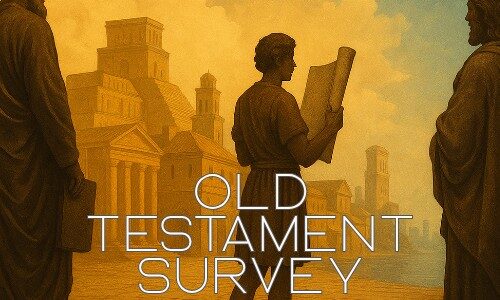This course is a comprehensive overview of the books of the Old Testament. Students learn about the key themes, narratives, literary genres (e.g., law, prophecy, poetry), and historical backgrounds of the Hebrew Bible.
Old Testament Survey
Level: Master’s
Course Length: 10 weeks (approx. 120–150 hours total if following full module path)
Delivery Mode: Competency-based, self-paced with required final exam
Course Overview
This course provides a comprehensive overview of the Old Testament (Hebrew Bible). Students will study the major sections, key themes, historical backgrounds, and literary genres of the OT, gaining tools to interpret the biblical text within its covenantal, theological, and historical framework.
The course is competency-based:
-
Students may complete all modules and assignments to prepare for the final exam, or
-
If students already have prior knowledge, they may skip directly to the final competency exam.
Mastery is demonstrated by the final exam, which assesses knowledge of the Old Testament’s structure, themes, and interpretive significance.
Learning Outcomes
By the end of this course, students will be able to:
-
Outline the structure and divisions of the Old Testament (Torah, Prophets, Writings).
-
Identify the major themes and theological motifs of each section.
-
Describe the historical, cultural, and literary backgrounds of the OT.
-
Recognize the distinct literary genres (law, prophecy, wisdom, poetry, narrative).
-
Demonstrate integrative understanding through analysis of representative OT passages.
Weekly Breakdown (10 Weeks)
Week 1: Introduction to the Old Testament (8–10 hours)
-
Canon of the Hebrew Bible vs. Christian OT.
-
Structure: Torah, Prophets, Writings.
-
Historical overview of Israel and covenant theology.
-
Competency: Explain the structure and purpose of the OT.
Week 2: Genesis and the Pentateuch (Part 1) (12–14 hours)
-
Creation, fall, flood, patriarchs (Genesis).
-
Exodus: deliverance and covenant at Sinai.
-
Competency: Identify covenant themes in Genesis–Exodus.
Week 3: The Pentateuch (Part 2) (10–12 hours)
-
Leviticus: holiness, worship, and law.
-
Numbers: wilderness journey.
-
Deuteronomy: covenant renewal and theology of obedience.
-
Competency: Explain theological motifs of the Torah.
Week 4: Historical Books (Joshua–Samuel) (12–14 hours)
-
Conquest and settlement (Joshua).
-
Period of the judges.
-
Rise of monarchy: Samuel, Saul, David.
-
Competency: Summarize Israel’s transition to monarchy.
Week 5: Historical Books (Kings–Chronicles, Ezra–Nehemiah, Esther) (12–14 hours)
-
Division of the kingdom: Israel and Judah.
-
Prophets and kings.
-
Exile and restoration: Ezra–Nehemiah.
-
Esther and providence.
-
Competency: Trace Israel’s history through exile and restoration.
Week 6: The Major Prophets (12–14 hours)
-
Isaiah: judgment and hope.
-
Jeremiah: covenant renewal and suffering prophet.
-
Ezekiel: visions and restoration.
-
Daniel: faith in exile, apocalyptic imagery.
-
Competency: Distinguish major prophetic messages.
Week 7: The Minor Prophets (The Book of the Twelve) (10–12 hours)
-
Hosea to Malachi.
-
Common themes: covenant faithfulness, justice, restoration.
-
Competency: Compare key themes across the minor prophets.
Week 8: Wisdom Literature (10–12 hours)
-
Job: suffering and divine justice.
-
Proverbs: wisdom for life.
-
Ecclesiastes: meaning and futility.
-
Song of Songs: love and covenant imagery.
-
Competency: Interpret wisdom texts within their genre.
Week 9: Poetry and Worship (10–12 hours)
-
Psalms: lament, praise, thanksgiving, royal psalms.
-
Lamentations: grief and theological reflection.
-
Competency: Analyze the role of poetry in Israelite worship.
Week 10: Theological Themes and Competency Exam Prep (10–12 hours)
-
The OT as a unified theological narrative.
-
Themes of covenant, law, land, kingship, prophecy, and worship.
-
Case studies and integrative review.
-
Final Competency Exam (required).
Assessment
-
Competency Exam (100%): Students must demonstrate mastery of OT content, structure, and themes.
-
Optional formative assessments: quizzes, reading guides, and reflection questions are available in modules but not required.
Curriculum
- 10 Sections
- 30 Lessons
- Lifetime
- Week 1: Introduction to the Old Testament (8–10 hours)Canon of the Hebrew Bible vs. Christian OT. Structure: Torah, Prophets, Writings. Historical overview of Israel and covenant theology.5
- Week 2: Genesis and the Pentateuch (Part 1) (12–14 hours)Creation, fall, flood, patriarchs (Genesis). Exodus: deliverance and covenant at Sinai.3
- Week 3: The Pentateuch (Part 2) (10–12 hours)Leviticus: holiness, worship, and law. Numbers: wilderness journey. Deuteronomy: covenant renewal and theology of obedience.4
- Week 4: Historical Books (Joshua–Samuel) (12–14 hours)Conquest and settlement (Joshua). Period of the judges. Rise of monarchy: Samuel, Saul, David.5
- Week 5: Historical Books (Kings–Chronicles, Ezra–Nehemiah, Esther) (12–14 hours)Division of the kingdom: Israel and Judah. Prophets and kings. Exile and restoration: Ezra–Nehemiah. Esther and providence.7
- Week 6: The Major Prophets (12–14 hours)Isaiah: judgment and hope. Jeremiah: covenant renewal and suffering prophet. Ezekiel: visions and restoration. Daniel: faith in exile, apocalyptic imagery.8
- Week 7: The Minor Prophets (The Book of the Twelve) (10–12 hours)3
- Week 8: Wisdom Literature (10–12 hours)Job: suffering and divine justice. Proverbs: wisdom for life. Ecclesiastes: meaning and futility. Song of Songs: love and covenant imagery.5
- Week 9: Poetry and Worship (10–12 hours)Psalms: lament, praise, thanksgiving, royal psalms. Lamentations: grief and theological reflection.3
- Week 10: Theological Themes and Competency Exam Prep (10–12 hours)The OT as a unified theological narrative. Themes of covenant, law, land, kingship, prophecy, and worship. Case studies and integrative review.4
Instructor

